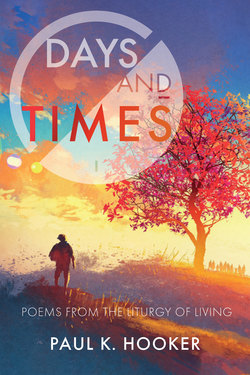Читать книгу Days and Times - Paul K. Hooker - Страница 6
На сайте Литреса книга снята с продажи.
First Thoughts: An Introduction
ОглавлениеIn these poems I have tried to pose, directly or indirectly, questions of faith and to explore them with an eye toward mystery, wonder, and occasionally suspicion. Some of these poems are an effort to tell the stories left untold by the narratives of faith. Some of them poke and prod the narratives of ordinary life to see where faith may be hiding itself.
I have come to think of faith not as a series of intellectual choices but as an involuntary trust in something beyond me, something almost always unclear, ill-lit, and mostly inadequately characterized by the language religious people use to describe ultimate realities. For most of my life, I have used that language, too. But lately I have noticed within me an impatience with things about which I was once sure. The propositional language of theology, simplistic assertions of faith, and reified ethics of ecclesial life no longer seem trustworthy to me. I am fascinated with darkness and uncertainty and more willing to be wrong than I have ever been. Strangely, however, it seems to me not that I have lost faith but have only just begun to find it.
Many of the poems in this volume fall into a classification I would call theo-poetry. The term is not original to me. As I understand it, theo-poetry refers to the poetizing of an existing faith, applying poetic imagination to the task of expressing faith claims and theological ideas. Theo-poetry does not so much seek to dismantle faith as to subvert its self-assuredness, to find language that surprises faith with the presence of mystery and wonder. Theo-poetry encourages playfulness with theology and faith, a willingness to challenge assumptions and say the irreverent word. If there is an aquifer beneath the poems in this volume, perhaps it is that.
Because a part of the discipline in which I live includes the observation of the movement of time according to the great seasons of the Church’s life, I have presented the poems here in two parts that reflect that movement. The liturgical year has two great cycles, or clusters of seasons. Advent-Christmastide observes the wonder of the incarnation, and Lent-Eastertide approaches and interprets the mystery of death and resurrection. Throughout each of these seasons are scattered various holy days—the festivals of Christmas Day, Epiphany, Baptism of the Lord, Ash Wednesday, the Triduum (or “Great Three Days” of Maundy Thursday through Holy Saturday), the Resurrection of the Lord, and Pentecost—in which the Church lifts up for reflection some event in its own life or that of its Lord. The first part of this collection weaves in and out of these holy days and the liturgical year generally, wandering through them with wondering and occasionally suspicious eyes.
But the great seasonal cycles of the liturgical calendar account for a little less than half of the year’s transit; the rest of time is understood as “ordinary,” in the sense that the Sundays are known merely by their numbers, or “ordinals”—second Sunday after Epiphany, seventeenth Sunday after Pentecost, etc.—rather than by the observation of a festival or special day. Though the intersection with the term “ordinary,” meaning “not special,” is not intended, there can be little doubt that in the long slog between Pentecost and Advent things get very ordinary, indeed. The second part of the project of these poems is an effort to re-enchant what has become ordinary, to expose the underlying wonder or mystery in events that have no place in the Church’s liturgy but a significant place in the liturgy of life.
No poet writes alone, and I have certainly not done so. I must thank those whose critical and appreciative eyes have helped make these poems better. I have prevailed on the graces of good friends Christina Berry, Dana Hughes, Theodore J. Wardlaw, and Janis Williams more than is either fair or reasonable, but they have read and re-read without complaint. Tracey Lander-Garrett has lent her well-trained critical eye to me as I struggled with writing and editing several poems. My colleagues and friends Cynthia Rigby and Lewis Donelson have broadened my view of the theological possibilities of poems and poetry in free-ranging conversations that I have treasured. My colleague and friend David White has been my teacher and guide in the fields of aesthetics and theopoetics. All of these have in ways they do not know contributed to these poems; none of them bears responsibilities for any failures or shortcomings herein.
Finally, I must thank Pat Thiede who has loved me, been patient with my curmudgeonly moods, and offered unfailing support as I wandered in and out of these poems. To her, with my undying love, this book is dedicated.
May your own holy days and ordinary times be full of mystery and wonder.
Paul Hooker
Lent, 2018
